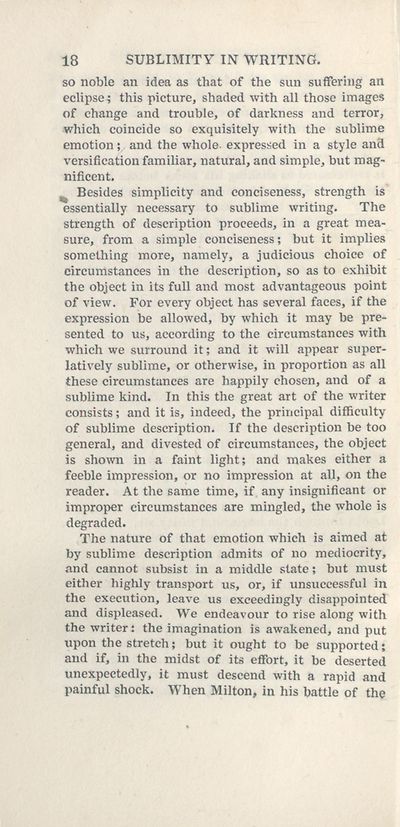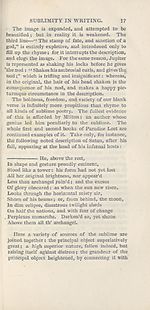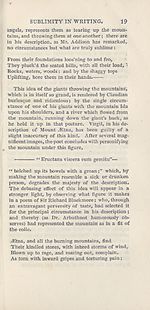Education > Essays on rhetoric
(46)
Download files
Complete book:
Individual page:
Thumbnail gallery: Grid view | List view

SUBLIMITY IN WRITING.
18
so noble an idea as that of the sun suffering an
eclipse ? this picture, shaded with all those images
of change and trouble, of darkness and terror,
which coincide so exquisitely with the sublime
emotion; and the whole expressed in a style and
versification familiar, natural, and simple, but mag¬
nificent.
^ Besides simplicity and conciseness, strength is
essentially necessary to sublime writing. The
strength of description proceeds, in a great mea¬
sure, from a simple conciseness; but it implies
something more, namely, a judicious choice of
circumstances in the description, so as to exhibit
the object in its full and most advantageous point
of view. For every object has several faces, if the
expression be allowed, by which it may be pre¬
sented to us, according to the circumstances with
which we surround it; and it will appear super¬
latively sublime, or otherwise, in proportion as all
these circumstances are happily chosen, and of a
sublime kind. In this the great art of the writer
consists; and it is, indeed, the principal difficulty
of sublime description. If the description be too
general, and divested of circumstances, the object
is shown in a faint light; and makes either a
feeble impression, or no impression at all, on the
reader. At the same time, if any insignificant or
improper circumstances are mingled, the whole is
degraded.
The nature of that emotion which is aimed at
by sublime description admits of no mediocrity,
and cannot subsist in a middle state; but must
either highly transport us, or, if unsuccessful in
the execution, leave us exceedingly disappointed
and displeased. We endeavour to rise along with
the writer: the imagination is awakened, and put
upon the stretch; but it ought to be supported;
and if, in the midst of its effort, it be deserted
unexpectedly, it must descend with a rapid and
painful shock. When Milton, in his battle of the
18
so noble an idea as that of the sun suffering an
eclipse ? this picture, shaded with all those images
of change and trouble, of darkness and terror,
which coincide so exquisitely with the sublime
emotion; and the whole expressed in a style and
versification familiar, natural, and simple, but mag¬
nificent.
^ Besides simplicity and conciseness, strength is
essentially necessary to sublime writing. The
strength of description proceeds, in a great mea¬
sure, from a simple conciseness; but it implies
something more, namely, a judicious choice of
circumstances in the description, so as to exhibit
the object in its full and most advantageous point
of view. For every object has several faces, if the
expression be allowed, by which it may be pre¬
sented to us, according to the circumstances with
which we surround it; and it will appear super¬
latively sublime, or otherwise, in proportion as all
these circumstances are happily chosen, and of a
sublime kind. In this the great art of the writer
consists; and it is, indeed, the principal difficulty
of sublime description. If the description be too
general, and divested of circumstances, the object
is shown in a faint light; and makes either a
feeble impression, or no impression at all, on the
reader. At the same time, if any insignificant or
improper circumstances are mingled, the whole is
degraded.
The nature of that emotion which is aimed at
by sublime description admits of no mediocrity,
and cannot subsist in a middle state; but must
either highly transport us, or, if unsuccessful in
the execution, leave us exceedingly disappointed
and displeased. We endeavour to rise along with
the writer: the imagination is awakened, and put
upon the stretch; but it ought to be supported;
and if, in the midst of its effort, it be deserted
unexpectedly, it must descend with a rapid and
painful shock. When Milton, in his battle of the
Set display mode to:
![]() Universal Viewer |
Universal Viewer | ![]() Mirador |
Large image | Transcription
Mirador |
Large image | Transcription
| Antiquarian books of Scotland > Education > Essays on rhetoric > (46) |
|---|
| Permanent URL | https://digital.nls.uk/113760044 |
|---|
| Description | Thousands of printed books from the Antiquarian Books of Scotland collection which dates from 1641 to the 1980s. The collection consists of 14,800 books which were published in Scotland or have a Scottish connection, e.g. through the author, printer or owner. Subjects covered include sport, education, diseases, adventure, occupations, Jacobites, politics and religion. Among the 29 languages represented are English, Gaelic, Italian, French, Russian and Swedish. |
|---|

